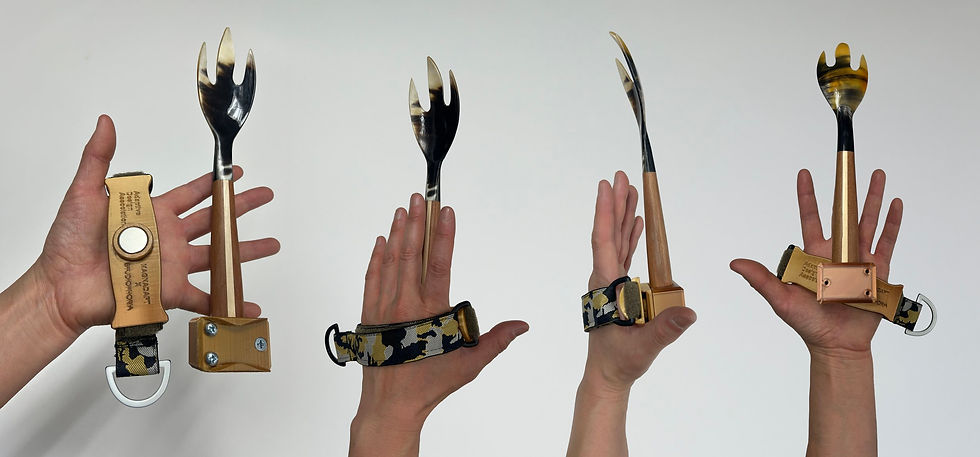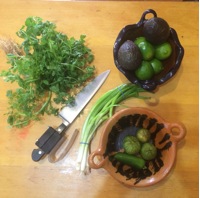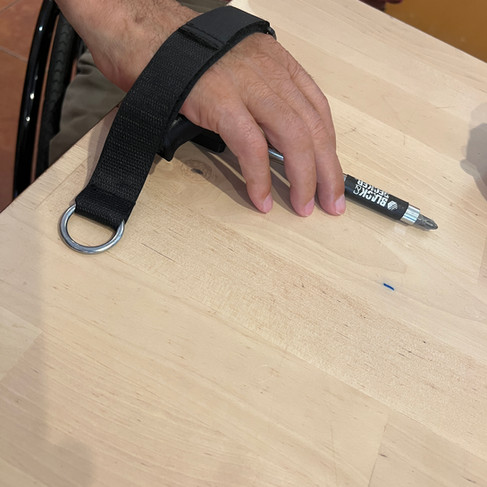Designing for the Joy of Cooking: Phil’s Story
- Jennifer Hercman
- Jun 25, 2025
- 4 min read
Updated: Jul 3, 2025
“Design is for EVERYONE!” — and at Adaptive Design Association (ADA), we take that to heart. Every custom adaptation we make begins with a conversation, a lived experience, and a need unmet by mass-produced solutions.
That’s how we met Phil, a passionate home cook and C6-7 quadriplegic, who first reached out in 2016:
“I am married to the only French woman in the world who doesn't like to cook,” he joked. “I, on the other hand, love to cook and I have been feeding my family for years.”
Phil had been using a custom knife holder built by a craftsman at the Rusk Institute nearly 30 years earlier. After years of use and multiple repairs, it finally broke—leaving him without a reliable way to prepare meals. The commercial catalogs offered no suitable replacements.
“I am going into panic and am hoping you can help me get back to chopping vegetables,” he wrote. “The key part for me is replacing the clip… unless you have a better idea.”
Working closely with ADA’s Senior Fabricator and Designer Adam El-Sawaf, Phil helped co-create a custom knife adaptation featuring a clamp and cuff system with a rotating pivot. It allowed him to hold his knife securely, adjust angles with ease, and most importantly—get back to cooking for the people he loves.
Eight years later, in 2024, Phil returned with a new goal: more versatility, faster utensil changes, and better alignment with his current needs. What emerged from this new collaboration was a complete redesign of his original setup: The Magnadapt System.
Introducing the Magnadapt
The Magnadapt is a newly designed adaptive aid for people with limited hand function or grasping ability. Inspired by Phil’s feedback and experience, it offers major improvements over traditional hand splints and palmar clips, expanding both functionality and ease of use.
The system includes two core components:
The Grip: A durable handle that straps securely and comfortably around the user’s hand using a nylon strap. It features a circular dovetail magnetic attachment point that allows for smooth utensil changes without the need for fine motor adjustments. The shape of the mount also allows the utensils to be easily rotated into different positions.
Utensil Bases: Each kitchen tool (knife, peeler, whisk, etc.) is fitted with its own base that slides magnetically onto the holder. Utensils can be swapped in seconds—allowing users to move fluidly between tasks.
Key benefits include:
More practical positioning of utensils for improved ergonomics and reach.
Dishwasher-safe materials for easy cleaning by hand or machine.
Fast attachment and detachment, supporting dynamic cooking or caregiving routines.
A low-profile, sleek aesthetic that emphasizes dignity, not just function.
In Phil’s words:
“As a person with a physical disability, I maintain my sanity—at least minimally—by living as independently as possible. Being able to do things for myself, without asking for help, allows me to be more productive and relieves pressure on the people around me.
The tools imagined and created by the Adaptive Design Association have allowed me to continue to do many things, in spite of the limitations imposed by my disability. Primarily, I am still the one who prepares meals for my family, even though my hands are completely paralyzed. While this may seem like a small household contribution, I can give my assurance that it has changed my life.”
Design That Centers Real Life
Since 2001, ADA has produced over 1,000 custom adaptations—from seating and mobility aids to tactile communication tools and adaptive kitchen equipment. Every piece is made in our New York City workshop, offered free of charge, and developed in collaboration with the people who use them.
Our programs—Adapt for Access, Made to Learn, and the Tactile Communication Program—don’t just produce tools. They teach others how to design them. Using accessible materials like cardboard and open-source 3D printing, we help individuals and communities build the confidence and skill to reimagine care, learning, and accessibility.
As Phil puts it—with sharp humor and deep sincerity:
“Traditionally, people with disabilities have been—often necessarily—marginalized because of the needs they require. With the assistance of modern technology, combined with the creativity of organizations like Adaptive Design Association, the inclusion of us ‘crips, gimps, blinks, crazies, and hand flappers’ becomes a reality.”
Magnadapt: More Than a Tool
The Magnadapt System reflects everything ADA stands for: co-creation, care, adaptability, and dignity. It’s more than just a kitchen solution—it’s a powerful example of how assistive design can evolve into something culturally resonant and personally empowering.
In 2025, the MAGNADAPTxSTUDIOPHORIA collaboration was featured by Common Things as part of the NYCxDESIGN Festival, spotlighting the intersection of accessibility, lifestyle, and design aesthetics. Developed in partnership with Elaine Young, ADA Board Member and Founder of STUDIOPHORIA, this iteration of the MagnaAdapt system explored assistive tools not only as functional necessities but as expressions of identity and care.
“We’re reframing assistive tools as lifestyle objects through an aesthetic language of form and function that transforms our values and the narratives we share about care, creativity, and belonging,” says Elaine Young.
This collaboration invites a broader audience to see assistive devices not as signs of limitation, but as objects of thoughtful design—crafted with beauty, intention, and individuality.


We’re grateful to Phil for his candor, his creativity, and his ongoing collaboration. And we’re proud to say: he’s back to chopping vegetables—and doing it in style.
At ADA, we’ll keep designing for difference, building with care, and championing the stories and tools that shape a more inclusive future—one project, one person, and one meal at a time.











